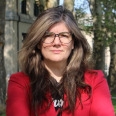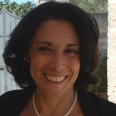Amanda Katz is an Assistant Professor of History at Utah State University in Logan, UT. She additionally serves as a faculty researcher for Advancing Self-sufficiency through Powered Infrastructure for Roadway Electrification (ASPIRE). The ASPIRE Engineering Research Center is a National Science Foundation (NSF) Generation 4 ERC that conducts vital research and development for widespread adoption of electrified transportation. As an applied historian she focuses on rural and municipal infrastructures, transportation policy, and historical continuities among transit networks among interconnected global communities. Katz earned her PhD in American History from Carnegie Mellon University in Pittsburgh, PA. Her current research project explores the development of American highway engineering in the early twentieth century. As a Fulbright Scholar, Katz will teach both graduate and undergraduate courses in the histories of science and technology, with special emphasis on examining continuities among Ottoman, Byzantine, and Islamic empires as well as the Greco-Roman era. Furthermore, in collaboration with her colleagues at the University of Crete, she will offer workshops and provide public lectures on matters of transportation infrastructures in peripheral or insular communities, and will conduct research at the Institute for Mediterranean Studies (IMS), Foundation for Research and Technology – Hellas (FORTH) on the relationship between terrestrial and maritime transportation systems of the Saronic Islands and the formation of local economies and cultural heritage.
Research/Teaching

Amanda Katz
Utah State University, Logan, UT
University of Crete, Rethymno
History of Science and Technology
February – June 2026

Barbara Prinari
University at Buffalo, Buffalo, NY
University of Ioannina
Mathematics
February - May 2026
Barbara Prinari is a professor of Mathematics at the University at Buffalo, New York. Dr. Prinari's research examines how wave phenomena, by means of mathematical models, often lead to a certain class of nonlinear partial differential equations referred to as integrable systems. Her main area of research deals with nonlinear waves and integrable systems, and has focused on both the study of the integrability of certain nonlinear partial differential equations and their discretizations (differential-difference equations), as well as the properties of these equations and their solutions. In her research, she has also explored how mathematical models can be used for social and behavioral sciences. The scholar and her colleagues have applied generalized kinetic methods and artificial neural networks to analyze and control the quality of an existing neuropsychiatric ward. In 2019, they developed a dynamical systems model for triadic reciprocal determinism to study how a person experiences stress or traumatic events, and the interplay among coping self-efficacy, behavior and the perception of external environment. The Fulbright fellowship will allow the scholar to engage in deeply collaborative research projects while also teaching a graduate course, all in her areas of expertise—the mathematical description and physical applications of nonlinear waves. The goal of the collaborative research that she will carry out with Dr. Horikis in Ioannina will be to develop a rigorous direct perturbation theory for the study of dark-bright solitons of the defocusing Manakov system over a constant background for physically relevant perturbations. The project will also involve Dr. Dimitri Frantzeskakis, from the National and Kapodistrian University of Athens. As to the teaching component of the award, Dr. Prinari will teach the graduate course EM9 “Specialized Topics in Applied Mathematics”, in which she will focus on the subject of “Nonlinear waves, integrable systems and the Inverse Scattering Transform”.

Michael Amitay
Rensselaer Polytechnic Institute, Troy, NY
Technical University of Crete, Chania
Experimental Fluid Dynamics and Aerodynamics
March - June 2026
Michael Amitay is the James L. Decker ‘45 Endowed Chair in Aerospace Engineering and the Director and founder of the Center for Flow Physics and Control at Rensselaer Polytechnic Institute (RPI). He received his D.Sc. (1994) from the Faculty of Aerospace Engineering at the Technion - Israel Institute of Technology in Israel. He was a post-doctoral fellow at the University of Arizona (1994-1996). From 1996 to 2003 he held several positions at Georgia Tech Research Institute and at Georgia Institute of Technology. He joined RPI in 2003. He is a Fellow of the American Institute of Aeronautics and Astronautics (AIAA) and the Royal Aeronautical Society (RAeS). Prof. Amitay has over 250 journal and conference publications, four book chapters, three conference papers that were awarded "best technical paper" by ASME and by AIAA, and eight U.S. patents. His current research interests are in the fields of experimental fluid mechanics, aerodynamics, and flow control with applications in aerial and ground vehicles. As a 2025-2026 Fulbright Scholar, Michael will be hosted at School of Production Engineering & Management, Technical University of Crete with Prof. Ioannis K. Nikolos to conduct research and teaching. Michael will conduct research on bio-inspired flow control where the ultimate goal of the research is to use the knowledge gained from the flow physics underlying aspects of avian dynamic environment rejection capabilities, to potentially incorporated them into human-designed systems. In addition, he will deliver a series of lectures on Aerodynamic Flow Control. The targeted audience are post-graduate students at the Technical University of Crete, who will participate in person, as well as post-graduate students throughout Greece, who will participate remotely. This will be coordinated with the host, Prof. Nikolos at the Technical University of Crete.
